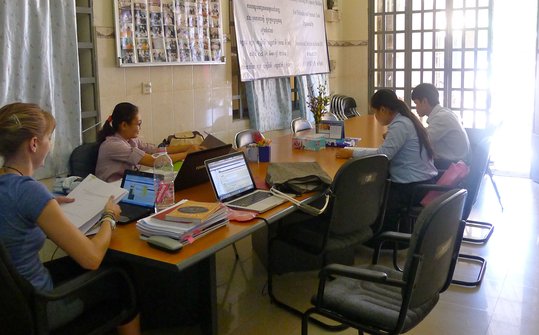First Days of Work

For three years prior to law school I worked for a wonderful legal aid office, Community Legal Services of Philadelphia. Working as a paralegal at CLS, I was able to see how free legal representation for the most vulnerable citizens encourages trust in the legal system and makes the system more equitable and responsive to those citizens. As a result of my experiences at CLS, I was curious to see what effects the provision of legal aid would have in a country where government sponsored violence and use of the courts as a tool of oppression have created strong feeling of suspicion of the court system.
In Cambodia until fairly recently the court system served as a means of carrying out the will of those in power, rather than a source of protection for citizens or a place for them to find justice. The system continued in this manner until 1993, when Cambodia ratified its current constitution. The current constitution explicitly creates a judiciary independent of other branches of government. In theory this should mean that those in power should not be able to interfere with decisions of the courts, that judicial decisions should be based on law and evidence, not the will of powerful members of government. In practice, however, many obstacles remain for ordinary Cambodians seeking justice in the court system. These include continued interference from other branches of government, citizens lack of knowledge of their basic legal rights (like the right to a lawyer) and corruption among police and court officials.
These problems are compounded by a lack of trained legal professionals and an even smaller pool of legal aid attorneys. In 2010 there were about 120 legal aid lawyers in the whole country, and many of those were only part time. While waiting for an aid lawyer to become available, people accused of felonies often wait months are often incarcerated months longer than the legally allowed pre-trial detention period. Even worse, prisoners are often tortured while in police or prison custody. The longer a prisoner remains jailed, the more likely the prisoner is to be tortured.
International Bridges to Justice Works to prevent torture, improve the courts and increase trust in the legal system by defending the rights of the accused. Of the 23 organizations providing legal aid services in Cambodia, IBJ id the only organization focused on criminal defense. The picture above is of one of my first days in the office. Ali, another IBJ intern (and W&M law student!) and I spent a few days reading about the Cambodian legal system and the state of legal aid in Cambodia. Next week Ali will be going to Ratanakiri, a province in the north of Cambodia. I will be staying in Phnom Penh to learn about the work IBJ lawyers do in the city.